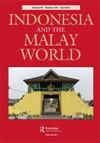Minangkabau male angst and the autobiographical mode
IF 0.9
3区 社会学
0 ASIAN STUDIES
引用次数: 0
Abstract
ABSTRACT Darman Moenir’s autobiographical novel, Bako, relates the experience of the protagonist – the ‘I’ of the narrative – residing with his mother in the community of his father’s relatives, the bako of the title. According to the principles of Minangkabau matriliny, neither he nor his mother are members of the father’s kin group and there is a tension in the relationship between mother and son on one side and the bako on the other. Through successive chapters, each concerning a significant individual in the protagonist’s boyhood and adolescence, the novel explores this tension and its effects on his mother. A close reading of key passages that employ a narrative device of shifting voices – the boy’s, the narrator’s, the author’s – reveals how the writing works to persuade the reader of the dramatic intensity of the boy’s quest for self-knowledge. A comparison with novels of Minangkabau society of an earlier period shows both continuity and change. The undisguised use of autobiographical experience on which the novel draws is explored through an illuminating comparison with Pramoedya Ananta Toer’s stories and through a glance at the genre of Japanese autobiographical novels and its conventions.米南卡保男性焦虑与自传体模式
摘要:达尔曼·莫尼埃尔的自传体小说《巴科》讲述了主人公——小说中的“我”——与母亲一起生活在父亲亲戚社区的经历,也就是书名中的巴科。根据米南卡堡母系关系的原则,他和他的母亲都不是父亲的亲属群体的成员,母子之间的关系是紧张的,儿子是一方,儿子是另一方。通过连续的章节,每个章节都涉及主人公童年和青春期的一个重要人物,小说探讨了这种紧张关系及其对他母亲的影响。通过对关键段落的细读,作者、男孩、叙述者和作者的声音转换叙事手法,揭示了作者的作品是如何说服读者相信男孩追求自我认识的戏剧性。通过与早期米南卡堡社会小说的比较,可以看出它既有延续又有变化。通过与Pramoedya Ananta Toer的故事进行具有启发性的比较,以及对日本自传体小说类型及其惯例的一瞥,探索了小说对自传体经历的毫不掩饰的使用。
本文章由计算机程序翻译,如有差异,请以英文原文为准。
求助全文
约1分钟内获得全文
求助全文
来源期刊

Indonesia and the Malay World
ASIAN STUDIES-
CiteScore
2.00
自引率
0.00%
发文量
17
期刊介绍:
Indonesia and the Malay World is a peer-reviewed journal that is committed to the publication of scholarship in the arts and humanities on maritime Southeast Asia. It particularly focuses on the study of the languages, literatures, art, archaeology, history, religion, anthropology, performing arts, cinema and tourism of the region. In addition to welcoming individual articles, it also publishes special issues focusing on a particular theme or region. The journal is published three times a year, in March, July, and November.
 求助内容:
求助内容: 应助结果提醒方式:
应助结果提醒方式:


